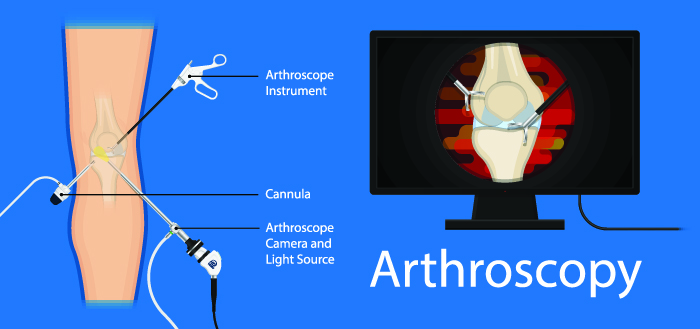Minimally Invasive Knee Replacement Surgery in Karol Bagh, Delhi
Minimally Invasive Knee Replacement Surgery involves the arthroscopic replacement of a damaged knee joint with an artificial knee joint.
What should you know about Minimally Invasive Knee Replacement Surgery?
Total Knee Replacement surgeons in Delhi insert a thin fiber-optic tube through tiny incisions to perform Minimally Invasive Knee Replacement Surgery. Doctors can visualize the internal structures of the knee joint on a video monitor while performing the surgery. Experienced orthopedic doctor in Nehru Place uses metal components for replacing the damaged parts of knee joints. Minimally Invasive Knee Replacement Surgery may not be suitable for all patients with damaged knee joints. Discuss your options with an expert orthopedic specialist in Delhi.

Who qualifies for Minimally Invasive Knee Replacement Surgery?
Individuals with an extensively damaged knee joint may qualify for Total Knee Replacement surgery in Nehru Place. The knee joint is prone to damage because of a variety of conditions.
- Bone tumor of the joint
- Traumatic injury and fracture
- Osteonecrosis
- Rheumatoid arthritis
- Osteoarthritis
Osteoarthritis is the most common reason for Total Knee Replacement surgery in Delhi. Your doctor will assess your condition and may try other non-surgical treatments to offer relief from pain and joint stiffness. Consult a doctor to know how a Minimally Invasive Knee Replacement surgery will be suitable to treat your condition.
Request an appointment at Apollo Spectra Hospitals, Nehru Place, New Delhi.
Call 1860 500 2244 to book an appointment.
Why is Minimally Invasive Knee Replacement Surgery performed?
Medical conditions of knee joints can cause severe pain and joint stiffness with movement restrictions. Doctors try to ease the pain and stiffness by using medication and other conservative approaches. Orthopedic doctors recommend Minimally Invasive Knee Replacement Surgery if other non-surgical methods to reduce pain and stiffness are not helping.
Total Knee Replacement surgeons in Delhi may suggest minimally invasive surgery to avoid the common complications of open surgery such as infection, bleeding and longer recovery time. A surgeon may recommend an Open Knee Replacement Surgery in certain conditions. Consult an orthopedic specialist in Delhi to understand how Minimally Invasive Knee Replacement Surgery may be appropriate.
What are the benefits?
Minimally Invasive Knee Replacement Surgery is the most promising procedure for patients with osteoarthritis. The surgical procedure involves minimum incisions and helps patients get back to routine activities faster than traditional knee replacement surgery.
Total Knee Replacement Surgery in Delhi assures a significant reduction in pain. The patient can also achieve greater flexibility of the knee joint with a remarkable improvement in the quality of life. A Minimally Invasive Knee Replacement procedure will reduce your hospital stay as the recovery is much faster. There is also less chance of post-surgical infections as the incisions are very few and tiny.
What are the risks?
- Nerve or tissue damage
- Clotting
- Loosening of polymer or metal components
- Fluid drainage from the site
- Fever
- Excessive swelling and pain in the knee
You should report to a doctor if you notice signs of infections after the procedure, including fever and swelling at the surgical site.
Consult any of the Total Knee Replacement surgeons in Nehru Place to know more about the procedure.
Request an appointment at Apollo Spectra Hospitals, Nehru Place, New Delhi.
Call 1860 500 2244 to book an appointment.
Reference sites:
https://www.mayoclinic.org/tests-procedures/knee-replacement/about/pac-20385276
Your doctor will examine the range of motion of your knee joint to know whether the Total Knee Replacement will help you. The surgeon will also assess the strength and stability of your knee joint. X-rays are helpful to determine the extent of damage to the knee joint. Your general health status, age, body weight, daily routine and size and shape of the knee are some factors to decide on the type of prostheses to replace the damaged knee joint. These factors are also helpful in choosing the type of knee replacement surgery.
You may have to stay at the hospital for a couple of days. Your doctor will ask you to limit your movements for some days. You may use a supporting cane or crutches till you gain strength. The range of motion exercises will help you improve the flexibility of the knee joint.
The average functional lifespan of most artificial knee joints is around 15 years. Follow doctor’s instructions regarding limitations. You may have to avoid activities that may cause a high impact. Avoid jogging, running and other competitive sports like jumping, football and cricket.
Symptoms
Our Top Specialities
NOTICE BOARD
CONTACT US
CONTACT US
 Book Appointment
Book Appointment


.svg)
.svg)
.svg)
.svg)








